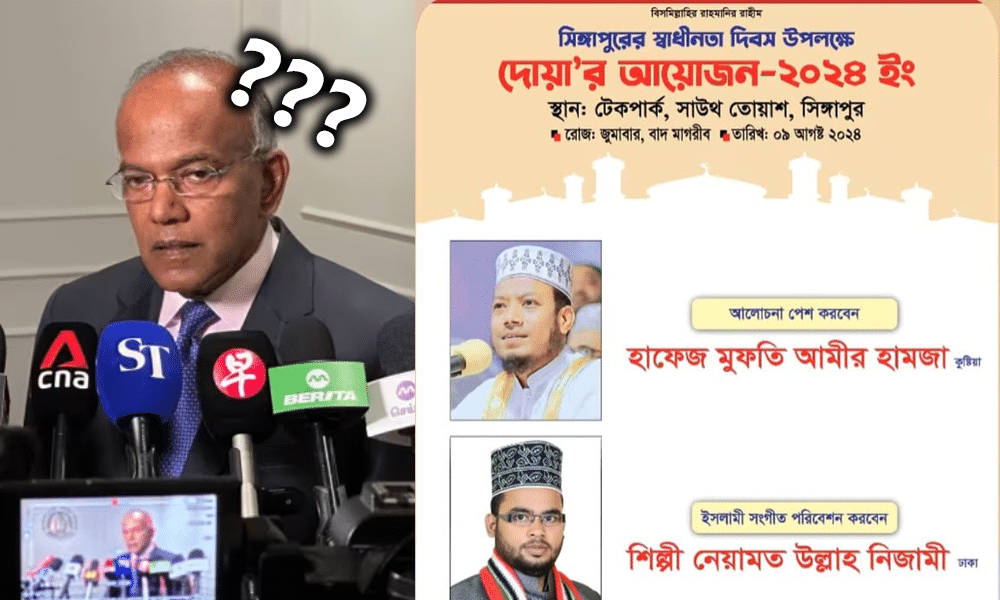The recent explanation by Minister for Home Affairs and Law K. Shanmugam regarding how Bangladeshi preacher Amir Hamza entered Singapore undetected raises more questions than it answers.
The minister pointed to a valid passport with a different name as the reason Amir Hamza “slipped through.” However, this explanation seems to overlook a glaring issue that becomes evident when examining a publicly circulated poster for an event featuring Amir Hamza.
This poster, written in Bengali and posted on Amir Hamza’s own Facebook page on 8 August 2024, clearly advertised an event scheduled for 9 August in Singapore.
The event, to be held at Tech Park Crescent in Tuas, Singapore, was not just any ordinary gathering.
Amir Hamza was explicitly listed as the featured speaker, identified by name and photograph, with the poster providing clear details about the timing of the event—after the Maghrib prayer.

Translation of poster according to Google Translate
Additionally, the poster mentioned another performer, Naim Uddin Nijami, who would deliver an Islamic music performance. The event was framed as a celebration of “Singers Independency Day,” a detail that should have caught the attention of anyone monitoring public gatherings in Singapore.
The poster wasn’t hidden; it was publicly accessible on the Facebook page of a known extremist figure.
It’s akin to a person listed as a security threat openly announcing on social media that they are coming to your country to speak at a specific location and time. Yet, the authorities failed to prevent his entry or stop the event.
The question then arises: If this poster was publicly available, why wasn’t it flagged by anyone in the relevant security agencies? Why weren’t the organizers immediately informed of the need for a police permit, as is routinely done with local activists planning much less contentious events?
Singaporean activists and opposition politicians are all too familiar with receiving calls from the police notifying them that their events require permits.
Often, these calls come even before the event details have been fully publicized. Yet in this case, despite the public visibility of the event and the known background of Amir Hamza, the authorities failed to intervene.
This begs the question: Are police resources disproportionately focused on monitoring local activists and opposition politicians while questionable figures like Amir Hamza slip through the cracks?
Moreover, it is essential to highlight that Amir Hamza, assuming he entered Singapore on a Bangladeshi passport, would have required a visa to enter the country.
The fact that he obtained a visa, combined with the authorities’ failure to detect his presence—unless Amir Hamza submitted a fake photo for his visa application or was in disguise while crossing the border—suggests that this lapse was not merely an isolated incident but a significant oversight in the immigration and security screening processes.
Minister Shanmugam has stated that Changi Airport must balance security with a friendly visitor experience, and it is impossible to interview every individual entering the country.
“On the face of it, he was no different from any other person who’s coming into Singapore. So we cannot work backwards in this, but we have to see what has happened,” he said.
“We will look at it, but bearing in mind that we need to make sure that we balance the security needs with the needs of the economy too.”
While this may be true, the incident with Amir Hamza suggests that there are serious flaws in how certain individuals are prioritized for scrutiny. The fact that this event occurred, despite all the safeguards supposedly in place, indicates a need for a thorough review of the processes that allowed it to happen.
The publicized poster, posted by Amir Hamza himself, is a stark reminder that the warning signs were there for anyone who was looking. The authorities’ failure to act on these signs suggests a deeper issue with how potential threats are identified and managed.
The poster had all the relevant information—the date, time, location, and the name of the speaker who should have raised red flags—and yet it seems that no one in the security agencies picked up on it.
Instead, they only became aware after a police report was filed days — likely spurred by a Reddit post on 12 August — after the event had taken place. This raises serious concerns about the effectiveness of current monitoring and intelligence practices.
Singapore prides itself on being a safe and secure nation, but this incident has exposed vulnerabilities that must be addressed.
The public deserves more answers and assurance that such a lapse will not happen again. The focus must be on improving our systems, not justifying oversights with vague explanations.

